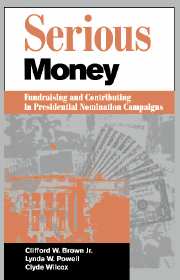Book contents
- Frontmatter
- Contents
- List of figures and tables
- Acknowledgments
- 1 Introduction
- 2 The regulatory environment
- 3 The contributor pool
- 4 Mobilizing the pool: Methods of soliciting campaign funds
- 5 Candidate resources
- 6 Recruiting contributors and solicitors: Candidate and individual decisions
- 7 Conclusion
- Appendix I The 1988 and 1992 presidential nomination surveys
- Appendix II 1988 and 1992 survey items used in the analysis
- Notes
- Bibliography
- Index
6 - Recruiting contributors and solicitors: Candidate and individual decisions
Published online by Cambridge University Press: 27 August 2009
- Frontmatter
- Contents
- List of figures and tables
- Acknowledgments
- 1 Introduction
- 2 The regulatory environment
- 3 The contributor pool
- 4 Mobilizing the pool: Methods of soliciting campaign funds
- 5 Candidate resources
- 6 Recruiting contributors and solicitors: Candidate and individual decisions
- 7 Conclusion
- Appendix I The 1988 and 1992 presidential nomination surveys
- Appendix II 1988 and 1992 survey items used in the analysis
- Notes
- Bibliography
- Index
Summary
We have shown that there exists a relatively constant pool of campaign contributors with a heterogeneous set of motives that are approached by candidates either through personal networks or through mail and telemarketing. Although campaigns often seek to expand the pool of contributors by attracting new members, two of the most basic decisions by campaign strategists are which segments of the existing pool to target and how to target them. Individual contributors must then decide whether or not to respond to a solicitation by a campaign. In addition, when campaigns employ personal networking, they must develop a strategy to identify which of their contributors will be asked to solicit others to give. Those asked to solicit must in turn decide whether or not to invest the time, energy, and social capital to do so.
Our panel study of 1988 and 1992 contributors enables us to examine these series of decisions by campaigns, contributors, and potential solicitors. The 1988 data consisted entirely of people who were asked to give and who gave, so we cannot compare them to those members of the pool who were not asked or who were asked but chose not to give in 1988. Thus, using the 1988 data alone we cannot examine campaign decisions about whom to solicit, or contributor decisions about whether to contribute. The 1992 survey asked the 1988 contributors whether they were asked to give in 1992, whether they gave, whether they were asked to solicit others to give, and whether they did solicit. The panel study therefore allows us to examine the decision calculus of candidates and potential contributors, which cross-sectional studies cannot do.
- Type
- Chapter
- Information
- Serious MoneyFundraising and Contributing in Presidential Nomination Campaigns, pp. 114 - 138Publisher: Cambridge University PressPrint publication year: 1995



